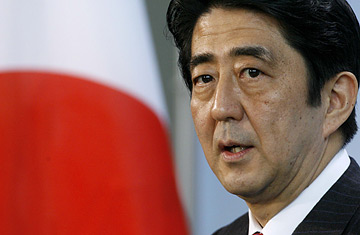
Japan's Prime Minister Shinzo Abe addresses a news conference following a meeting with German Chancellor Angela Merkel at the Chancellery in Berlin January 10, 2007.
Last week, however, Abe put his pragmatic reputation in doubt when he stepped into one of the most toxic controversies surrounding Japan's conduct in World War II, publicly expressing his doubt that the Japanese military had coerced foreign women into prostitution. Though many Japanese historians and politicians dispute the details, scholars believe that up to 200,000 women were compelled to serve in military brothels as "comfort women," a euphemism for virtual sex slaves, many of whom were horribly abused. In 1993, after years of evading responsibility, the Japanese government issued a statement officially acknowledging the army's role — direct or indirect — in the forced prostitution. The reaction across Asia to Abe's remarks was instant and angry, with South Korea's foreign minister calling on Japan to "face the truth," while septuagenarian former sex slaves in the Philippines furiously denounced Abe as a liar.
The Prime Minister's aides rushed to assure the world that his administration still supported the 1993 statement, but Abe repeatedly denied the military's role in actually forcing women to serve as prostitutes. He was responding in part to a nonbinding resolution introduced by a Japanese-American Democratic congressman in the U.S. House of Representatives that calls on Japan to make a fuller apology for the abuse of the "comfort women." That, Abe has said, would never happen — and on Thursday he announced that his government would assist a group of right-wing Japanese legislators in their efforts to reinvestigate the allegations of forced prostitution in order to refute "ungrounded criticism" of Japan's wartime behavior. Nariaki Nakayama, the former education minister who is leading the group, denies any military role in procuring "comfort women," and last week said "it is useful to compare the brothels to college cafeterias run by private companies, who recruit their own staff, procure foodstuffs and set prices."
Although Abe's stance on "comfort women" looks set to spark a new wave of outrage in the region, in reality the Prime Minister is simply drifting back toward the right-wing opinions he expressed as a legislator. More interesting is why he's choosing to do so now. One theory is that becau se his approval ratings have been falling for months ahead of vital elections to be held in the spring, he may feel the need to shore up his conservative support base. But in pandering to the right, he could throw away something far more important — Japan's improving relations with China and South Korea, its vital neighbors and trade partners. With the 70th anniversary of the Nanking massacre (when invading Japanese troops targeted the Chinese city) coming up at the end of 2007, attempts by Japan's leader to revise his country's wartime history potentially carry a heavy diplomatic price.
Abe might want to remember words written by his predecessor, Koizumi: "We must not evade the weight of the past, nor should we evade the responsibilities for the future." That was in a letter of apology to the "comfort women."
